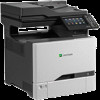Lexmark XC4143 Users Guide PDF - Page 20
Using Display Customization, Setting up Device Quotas, Managing screen saver and slide show images
 |
View all Lexmark XC4143 manuals
Add to My Manuals
Save this manual to your list of manuals |
Page 20 highlights
Setting up and using the home screen applications 20 Using Display Customization Before using the application, make sure to do the following: • From the Embedded Web Server, click Apps > Display Customization > Configure. • Enable and configure the screen saver, slideshow, and wallpaper settings. Managing screen saver and slide show images 1 From the Screen Saver and Slideshow Images section, add, edit, or delete an image. Notes: • You can add up to 10 images. • When enabled, the status icons appear on the screen saver only when there are errors, warnings, or cloud‑based notifications. 2 Apply the changes. Changing the wallpaper image 1 From the home screen, touch Change Wallpaper. 2 Select an image to use. 3 Apply the changes. Running a slide show from a flash drive 1 Insert a flash drive into the USB port. 2 From the home screen, touch Slideshow. Images appear in alphabetical order. Note: You can remove the flash drive after the slide show starts, but the images are not stored in the printer. If the slide show stops, then insert the flash drive again to view the images. Setting up Device Quotas Notes: • This application is supported only in some printer models. For more information, see "Supported applications" on page 18. • You may need administrative rights to access the application. 1 Open a web browser, and then type the printer IP address in the address field. Notes: • View the printer IP address on the printer home screen. The IP address appears as four sets of numbers separated by periods, such as 123.123.123.123. • If you are using a proxy server, then temporarily disable it to load the web page correctly. 2 Click Apps > Device Quotas > Configure.















